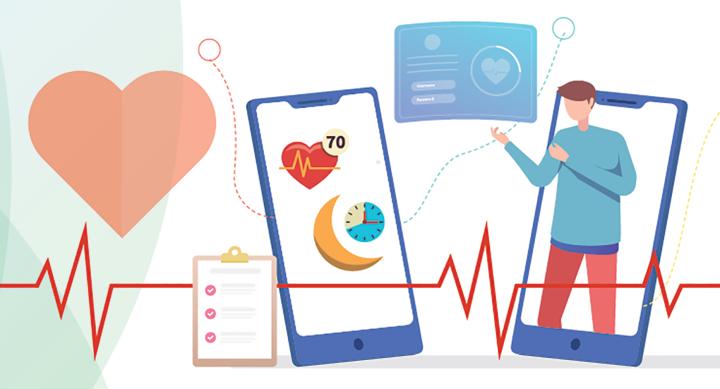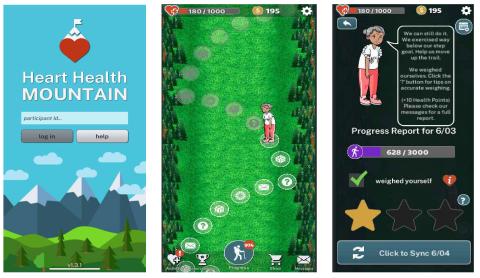
"Witnessing my own father’s battle with heart failure further fueled my determination to develop tools that could prevent early deaths and enhance the quality of life for those affected by cardiovascular conditions.” - Kavita Radhakrishnan
In today’s rapidly evolving health care landscape, technology is increasingly playing a pivotal role in reshaping patient care and outcomes. Among the groundbreaking innovations emerging in this realm is the integration of gaming devices into health care practices, particularly in the management of chronic conditions like heart failure. Leading this transformative initiative is Kavita Radhakrishnan, PhD, MSEE, RN, FAAN, FAHA, associate professor, with her research in leveraging sensor-controlled digital games (SCDGs) to enhance health care delivery.

Radhakrishnan’s journey into health care technology began with a deep-rooted commitment to improving patient self-care behaviors. Recognizing the limitations of traditional telehealth methods in effectively engaging patients, she explored innovative solutions that could bridge the gap between data collection and meaningful self-care actions.
“Since 2010, my research has always centered around using technology to empower individuals to take better care of themselves,” Radhakrishnan said. “This mission was deeply personal for me, stemming from the loss of several family members to heart disease at a young age. Witnessing my own father’s battle with heart failure further fueled my determination to develop tools that could prevent early deaths and enhance the quality of life for those affected by cardiovascular conditions.”
Winning at well-being
Driven by this personal mission, Radhakrishnan’s research evolved over the years, developing SCDGs designed to empower patients in managing their heart failure. Collaborating with experts across disciplines, including electrical engineering, computer science and game development, Radhakrishnan and her team meticulously crafted devices that seamlessly integrate behavior-tracking sensors with engaging digital interfaces.
The goal of the study is to assess whether digital tools, such as the game “Heart Health Mountain,” can help participants improve their adherence to important self-management behaviors, such as daily physical activity and weight monitoring.
Participants receive an activity tracker and smart scale, which is synchronized with the game, so participants can progress up the mountain as they meet their daily goals for activity and weight monitoring.
The goal of the game is to keep their “heart health” score high. Throughout the game, they can also win coins that can be redeemed to buy accessories for their avatar.
Participants do not “win” the game, but rather progress as far as they can up the mountain, through many interactive levels, during the six-month study period.
“The transition to gaming medium stemmed from a desire to empower patients with real-time insights into their health status and self-care behaviors,” she added. “By visualizing daily behaviors and their implications for health outcomes, we aim to motivate patients to adopt healthier habits and achieve optimal well-being.”
Building upon the success of initial pilot studies, Radhakrishnan secured substantial funding from the National Heart, Lung and Blood Institute at the National Institutes of Health (NIH) to further evaluate the efficacy of SCDGs in improving heart failure management. These grants, totaling $6.5 million, represent a significant investment in advancing health information technology and its application in patient care.
An evolving approach
Recognizing the diverse cultural landscapes within which health care interventions operate, Radhakrishnan emphasizes the importance of cultural adaptability and community engagement in her research endeavors.
Collaborating on other research projects with experts like, Jada Brooks, PhD, MSPH, RN, FAAN, associate professor from The University of North Carolina, Chapel Hill School of Nursing and John Lowe, PhD, RN, FAAN, Joseph H. Blades Centennial Memorial Professorship in Nursing at the School of Nursing, she wants to ensure that SCDGs resonate with the unique values and preferences of diverse populations.
Radhakrishnan’s collaborative study with Brooks, funded by a $3.8 million NIH grant, will determine whether her SCDGs to manage heart failure are culturally adaptable. Working with the Lumbee Native American Tribe in North Carolina, they are using a community-based participatory research method by talking with members of the community and identifying their preferences as they work to adapt the intervention.
In collaboration with Allison Crawford, PhD, RN, assistant professor from UT Health San Antonio School of Nursing, and Janice Hernandez, DNP, RN, FNP-C, clinical associate professor at the School of Nursing, the team has developed a Spanish language version of the heart health game.
“As technology evolves, so too must our approach to health care delivery,” Radhakrishnan said. “By actively engaging with communities and soliciting their input, we strive to create interventions that are not only effective but also culturally relevant and accessible to all.”
Enhancing patient outcomes
At the heart of Radhakrishnan’s research lies a spirit of collaboration and teamwork. Recognizing the contributions of her interdisciplinary team and research colleagues, she attributes much of the project’s success to their collective efforts and expertise.
“My team and I have been fortunate to work with outstanding individuals across various disciplines, each bringing unique insights and perspectives to the table,” she added. “Through our collaborative endeavors, we have been able to push the boundaries of health care innovation and make meaningful contributions to patient care.”
As health care continues to evolve in response to technological advancements, the integration of gaming medium holds tremendous promise for enhancing patient outcomes and transforming the delivery of care.
Through her research in leveraging SCDGs for heart failure management, Radhakrishnan has emerged as a trailblazer in the field of health information technology, reshaping the future of health care one game at a time.
“As we look to the future, our focus remains on scaling up our research efforts and ensuring that our interventions are accessible to all,” Radhakrishnan concluded. “By harnessing the power of technology and embracing a patient-centered approach, we can truly revolutionize the way we manage chronic conditions and improve the lives of patients worldwide.”

Game responsive to real-time behaviors
- Adaptive step goal
- Heart health point
- Bite-sized chunks of info about heart failure
- Mini-games
- Quiz questions
- Behavior quests
- Leaderboard
- Shop